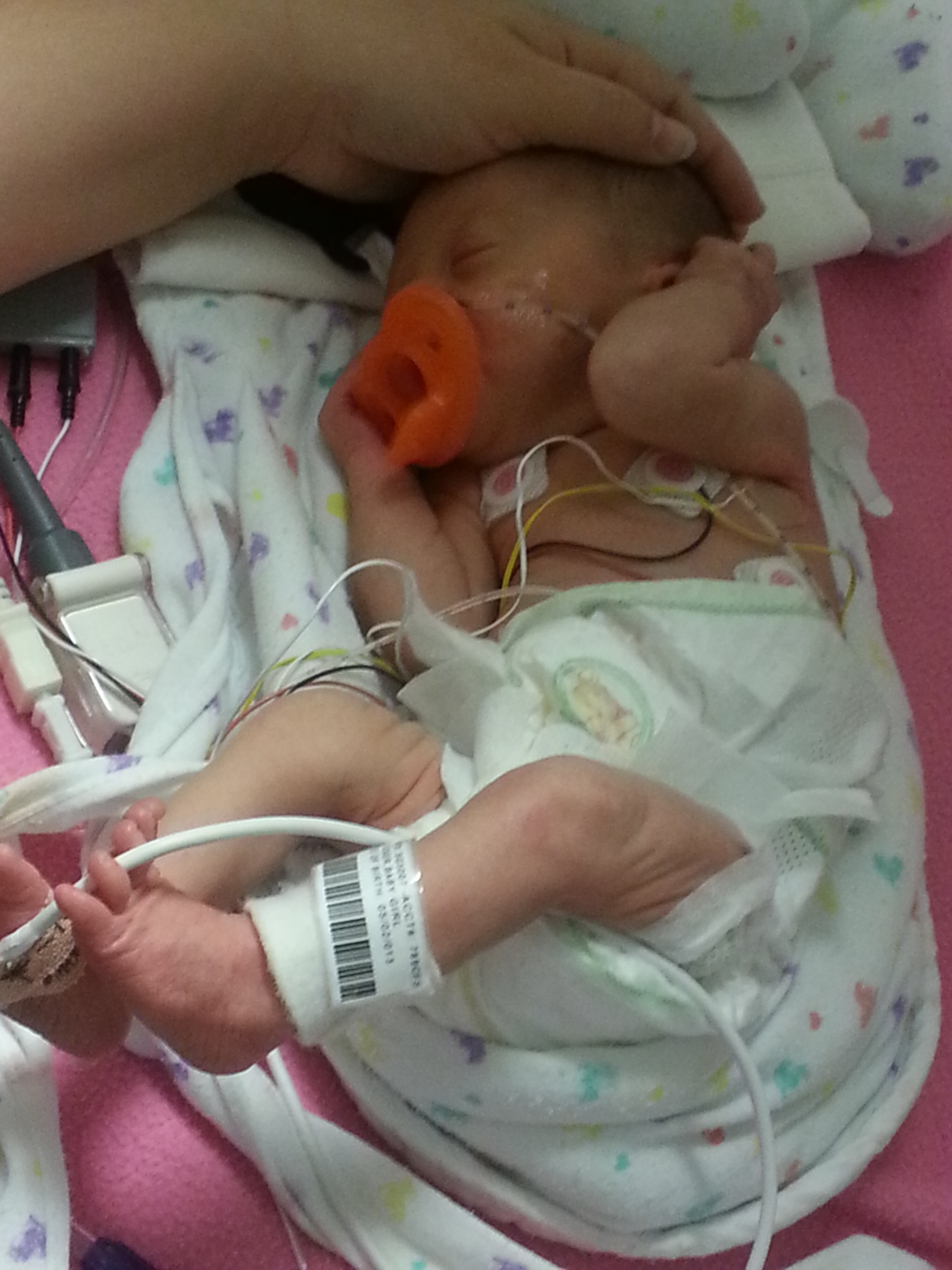Learning the Language: Why IDs Don't Need To Be SMEs
When my daughter was born early, I quickly learned the language of the NICU. Learning jargon in a new field is part of what we do as instructional designers. We don’t need to be SMEs; we just need to know how to talk to SMEs.
My daughter was born last May. “E” was in a hurry to meet us and arrived two months early. When my water broke, we rushed to Duke University Hospital. I quickly received a dose of betamethazone and a bolus of magnesium. E spent over a month in the NICU. My conversations were suddenly filled a whole new language: brady, desat, gavage, TPN, bili lights, central line, kangaroo care.

My husband and I continued working while she was in the NICU. I had to finish up a few projects before my maternity leave could really start. I pumped every three hours, so I never got more than two hours of sleep at a stretch that whole month. We drove 40 minutes to Duke every afternoon to visit her in the hospital, while juggling work and getting the house ready for her to come home. The staff at Duke were wonderful and helpful, but I was completely exhausted.
As fatigued and stressed as I was, I quickly learned the language of the NICU. In the first week, five separate nurses or doctors at Duke asked me if I had a medical background. I seemed so familiar with the terminology that they assumed I had formal training. I always chuckled and explained that I have no medical background, but learning the language of different fields is part of what I do for a living. As an instructional designer, it’s my job to be able to work with experts in lots of different subjects. The fact that multiple healthcare practitioners were fooled into thinking I’m one of them is just a sign that I’m a competent ID.
A few years ago, I wrote a course on bulldozer safety. I’ve never even ridden on a track dozer, but working on that course expanded my vocabulary: tramming, trunnion, berm, FOPS, frog, grouser, windrow, ROPS. Every organization also has its own lingo. At Cisco, I’d ask people to “pass me the ball” during meetings so we could finish before our “hard stop” and discuss what’s changed in CSAP since the program was “put on pause.” Like any big organization, Cisco uses hundreds of acronyms, and the same acronym in one group can have a different meaning in another team.
Learning those acronyms and becoming familiar with the vocabulary of your organization and field is part of the job of an instructional designer. It’s actually one of my favorite aspects of being an ID; one of the reasons I enjoy freelance work is that I’m constantly learning new things from a variety of sources. Lifelong learning is a major perk of this career.
I’ve seen people argue that IDs should have content expertise in the fields where they develop courses. Usually it’s in job listings where a company requests something like “5-10 years experience in healthcare or pharmaceuticals.” I’ve even seen someone in the learning field argue that content expertise is an “essential” qualification for doing this job. Personally, I think that’s completely wrong. It’s not essential; it’s not always even beneficial.
I agree with Connie Malamed: Instructional designers are content neutral. Connie explains some strategies for gaining knowledge when you’re not a mini-SME: preexisting content, instructional analysis, task analysis, research, and interviews. Even without the motivation of being responsible for the well-being of a teeny tiny human being, you can do the research and learn enough about a field to ask SMEs intelligent questions. That’s often the real key: do you have the right language to ask the right questions? We don’t need to be SMEs; that’s why we have a SME on our team. Our role is to be experts in learning, not on the content. We do have to learn about the field so we can collaborate with SMEs and develop content, but we don’t need the true depth of expertise of a SME. As long as we can learn the language, we can ask the right questions and explain our ideas in a way that others can understand them. We don’t need to be SMEs; we need to know how to talk to SMEs.
E is now 10 months old and doing great. Her language skills right now are focused mostly on blowing raspberries and saying ba-ba-ba-ba, but that’s a fun language for us to play with together.

E. is gorgeous and what a great start that she had the best of care and parents who “knew the lingo”. It was interesting to read your thoughts on not needing to have definitive expertise, but that the language of a field is critical to your “job”. So, does the trunnion, frog, grouser tramming help the tramming and berm with the FOPS? : ) The language is the key. You could design anything. : ) Of that, I’m convinced. Have a sweet time watching E grow up. She is certainly on her way.
Connie Malamed (who I stole the phrase “content neutral” from) says she could design a course on nuclear physics if someone gave her a chance. Even though she has no background in that, I believe her!
There are times when it’s helpful to have some expertise in the content. Having taught in K-12 classrooms does make it easier for me to develop courses for teachers. I have a similar education to other teachers, and I can imagine realistic scenarios for them to apply new skills. But that reinforces my point to some extent. I can speak the language of teachers, and my baseline knowledge is similar to them. It might be less beneficial for me to develop a course for non-music teachers on, say, music theory. I have a degree in music education (plus years of private lessons), so my baseline knowledge is much higher. It would be harder for me to think back to what a non-expert would already know.
She’s adorable! And yes, while it can be helpful to have hands-on experience when designing a course, it doesn’t mean you CAN’T design a course if you don’t have it. I’m finding that to be a learning opportunity for those hiring IDs.
Thanks! I think she’s terribly cute, but of course I’m a little biased. 🙂
Having experience can be a detriment, especially if the learners you’re designing for are novices. That curse of knowledge creeps in when you least expect it. In general, I think it’s helpful if the ID has a comparable starting knowledge as the audience for the courses. It gives you a much more realistic view of what’s really safe to assume people know.
Thanks for the post and sharing your story. Your daughter is adorable!
Great post. I transitioned from being an ID for a large corporation where I was somewhat of a SME to being an ID with a company where the courses I create could be on any topic of which I may not have prior knowledge. Great reminder that as long as I focus on the learning and ask the right questions, I should continue to be a great ID. Thanks!
This was one of the big transitions for me as well when I moved from teaching and corporate training where I was the expert. When I write materials for myself as a trainer, I only document just enough to remind myself what I want to say. My instructor notes aren’t particularly helpful for anyone other than me. When I became an ID, I had to really step back and think about how to document everything so someone else could understand it. In some respects, not being a SME was helpful in that process. When you’re an expert, you skip over steps because you’ve already mentally automated them. Being an outside is beneficial; you can see where a novice learner needs those interim steps, concepts, or terms articulated more clearly.
Cute child and well-argued point about IDs and SMEs. I agree with you wholeheartedly. Thanks for sharing your story.